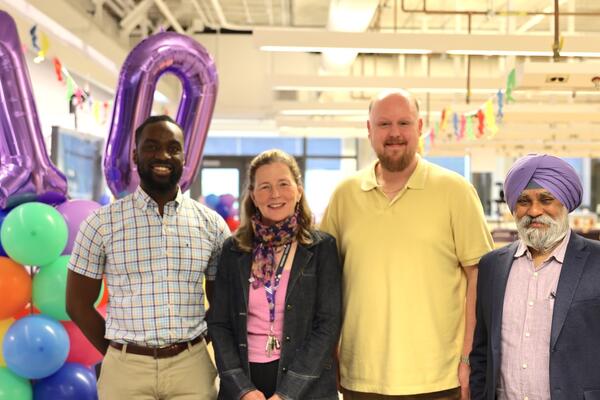
'The father of pavement asset management' is fondly remembered
Technology developed by Ralph Haas resulted in better-performing and less costly road networks

Technology developed by Ralph Haas resulted in better-performing and less costly road networks
By Carol Truemner Faculty of EngineeringRalph Haas, distinguished professor emeritus of civil and environmental engineering, died suddenly on June 19 at the age of 87.
Haas, whose pioneering concepts and technologies resulted in better-performing and less costly road networks, was known throughout the engineering world as 'the father of pavement asset management.'
Among the dozens of academic and professional honours he received, Haas was a member of the Order of Canada, the Royal Society of Canada, the Engineering Institute of Canada, a fellow of the Canadian Academy of Engineering, and recipient of the Queen's Golden Jubilee and Diamond Jubilee medals.
His obituary says that he was born in a log cabin in northwestern Alberta near the isolated hamlet of Dixonville and grew up on a farm "where hard work was not an option."
After graduating from high school at the age of 16, Haas worked on road survey crews for the Alberta Highways department. He lived in isolated work camps where an increasing number of young university-trained engineers began arriving.
"This started the realization that there was a limit to what you could do as a high school graduate," his obituary reads. "After eight and a half years of working he made the decision to attend the University of Alberta in the civil engineering program."
Haas completed bachelor’s and master’s degrees in engineering at the University of Alberta and a PhD at the University of Waterloo.
He was presented with a Distinguished Alumni Award from the University of Alberta for his role in developing and implementing systems, concepts and technologies for managing networks of paved roads. In 2018, he received the University’s highest honour, Doctor of Science, honoris causa.
Haas was a former chair of the University of Waterloo's civil and environmental engineering department and the founder and inaugural director of the Centre for Pavement and Transportation Technology at Waterloo. He was the author of 12 books and numerous technical articles on pavement and infrastructure asset management.

Ralph Haas, professor emeritus and former chair of Waterloo's civil and environmental engineering department, died June 19.
His professional service included roles as past director of the Applied Science and Engineering Division of Academy III of the Royal Society of Canada and co-founder of the Transportation Association of Canada (TAC) Foundation.
“The passing of Ralph Haas truly marks the end of an era. After 55 years, it’s hard to imagine any TAC event without him, but we will raise a glass in remembrance, grateful for all that he has done, honoured to have known him, and missing him greatly,” says Sarah Wells, executive director of TAC, in a message about Haas’s death posted on the TAC website.
In 2015, Waterloo Engineering named a laboratory in Engineering 3 the Ralph Haas Infrastructure and Sensing Analysis Laboratory in recognition of his many accomplishments. That same year he received the US National Academies Transportation Research Board’s (TRB) highest honour, the Roy W. Crum Award for Outstanding Achievement in Transportation Research.
His obituary notes that it was in his 50th consecutive year of attending TRB in Washington, DC that he received the award.
“While it is hard to believe that such an attendance record could be exceeded, in 55 years, he also never missed a set of TAC spring technical meetings or an annual conference.”
Haas and his late wife Rose were parents to two daughters and son Carl Haas, the current chair of Waterloo’s civil and environmental engineering department.
Due to COVID-19 restrictions, a private memorial service will be held at the Erb & Good Family Funeral Home in Waterloo on June 27 at 1 p.m. Relatives and friends may join the family in the livestream of the service at www.erbgood.com.

Read more
Redefining capstone learning by bringing students, faculty and community partners together to tackle real-world challenges

Read more
Here are the people and events behind some of this year’s most compelling Waterloo stories

Read more
The Pearl Sullivan Engineering IDEAs Clinic marks a decade of delivering experiential learning embedded in the real world and mentored by industry professionals
The University of Waterloo acknowledges that much of our work takes place on the traditional territory of the Neutral, Anishinaabeg, and Haudenosaunee peoples. Our main campus is situated on the Haldimand Tract, the land granted to the Six Nations that includes six miles on each side of the Grand River. Our active work toward reconciliation takes place across our campuses through research, learning, teaching, and community building, and is co-ordinated within the Office of Indigenous Relations.